Premium
Ben Jipcho: Track star who was respected abroad, but totally forgotten at home
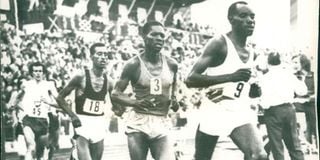
Ben Jipcho of Kenya (second right) trails compatriot Philip Ndoo during a 3,000m steeplechase race run in Oslo, Norway in this undated photo. Jipcho won the race as Ndoo finished third.
What you need to know:
- In track and field Kenya famously won the 4 X 400m final with Charles Asati, Francis Musyoki, Bill Koskei and Julius Sang. Asati went on to win the 400m individual race while John Kipkurgat won the 800m final.
- In the 800m women’s race Sabina Chebichi took bronze behind Australia’s Charlene Rendina and New Zealand’s Sue Haden.
in Christchurch, New Zealand
Ben Jipcho’s performance must have been truly outstanding to get a road named after him in Christchurch, New Zealand.
Jipcho Road is a typical industrial area road, connecting the busy Parkhouse Road with McAlpine Street, seven kilometers west of the city centre.
Most visitors to Jipcho Road’s probably take their cars and trucks to the vehicle inspection centre on 26 Jipcho Road or visit the café at the corner of Jipcho and Parkhouse for a coffee.
The rest of the road hums along as trucks back into warehouses as roller doors are opened and shut.
Like its own name, Christchurch’s geography is steeped in English presence that dates back to British settlement organized by the Canterbury Association in the 1850s.
Oxford Terrace, New Brighton Beach and the Avon River are all city locations and its heroes boast titles like Sir Richard Hadlee, Lady Diana Isaac and Sir Don Beaven. With a culture that leans to English class hierarchy, talk of ‘too much immigration’ is never too far from public conversation.
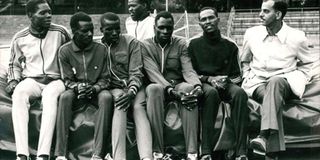
Kipchoge Keino (second right) with coach Feisal Sherman (right), fellow athletes Ben Jipcho (left) and Naftali Temu (second left) among others in their running days. PHOTO | FILE | NATION MEDIA GROUP
Around the time of Ben Jipcho’s visit in 1974, the Canterbury Trade Association had sent a telegram urging the minister of labour to stop all immigration “until we know where we are”, quoted the Press newspaper.
The region loves its sport. From horseracing to athletics, Canterbarians are known for their sporting competitiveness. Sports is actively pursued by all ages at sea and on land at every level between easy to world class.
In 1970, in the spirit of Christchurch’s love for sport, New Zealand’s organizing committee, Commonwealth Games Promotion, pulled all stops when it put in a bid to host the 1974 Commonwealth Games.
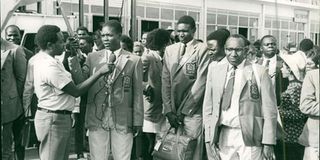
World 3,000m steeplechase record holder and Team Kenya captain Ben Jipcho (second left) talks to the press upon arrival from the country in this undated photo. PHOTO | FILE | NATION MEDIA GROUP
Sending delegations to all countries of the Commonwealth, New Zealand’s bidding organization, Commonwealth Games Promotion, hosted several receptions in Edinburgh before a vote on the 1974 games was taken.
Unsurprisingly, the Commonwealth assembly voted strongly in favour of Christchurch hosting.
The Commonwealth Federation’s reaction after Christchurch’s win was to institute a new rule limiting the amount of entertainment offered, “in particular (bidders) will not be allowed to give cocktail parties and receptions in the city where the decision was made”, said K.S.Duncan, the federations secretary.
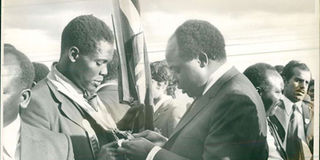
Minister for Finance and Planning Mwai Kibaki (right), admires one of the gold medals won by Ben Jipcho. Jipcho won gold medals in 3,000m steeplechase and 5,000 metres as well as bronze in 1,500 metres at the 10th Commonwealth Games held in Christchurch, New Zealand in 1974. PHOTO | FILE | NATION MEDIA GROUP
An athletic stadium and pool were built at the spacious Queen Elizabeth II Park, formerly the New Brighton Trotting club, with seating for 35,000 in its main arena.
The New Zealand Broadcasting Corporation planned to broadcast live in colour television for the first time as Christchurch prepared to host its visitors. With the stage set the games needed international stars to anchor its games, and none was on fire like the middle-distance runner Ben Jipcho.
Jipcho, a 30 year old prison officer, arrived in Christchurch having won his last four steeplechase races and had broken the world 3000M steeplechase record twice in the previous year, clocking 8:19.8 on 19th June 1973 and breaking it again eight days later with an 8:14.0, both times in Helsinki.

A road named after Kenyan athletics legend Ben Jipcho in Christchurch, New Zealand.
Jipcho was also a world class 5,000m and 1,500m runner, leading radio presenter Peter Wade the sports commentator to speculate that “the gold medal for the steeplechase can already be engraved with the name Ben Jipcho”, days ahead of the race. Not only was Jipcho on form, his archrival in whose shadow he stood, the great Kipchoge Keino, had retired the previous year.
Jipcho had been Kipchoge’s rabbit when the two out-foxed the American Jim Ryun in the 1,500m in 1968, running Ryun out of steam before Keino broke the Olympic record in Mexico’s ‘thin’ air.
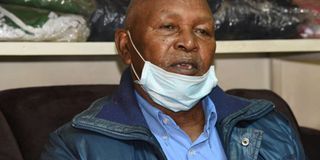
Legendary athlete Kipchoge Keino, at his shop, ‘Kipkeino Sports Centre’ in Eldoret town, Uasin Gishu County, mourns the death of former Olympic 3,000m steeplechase silver medalist Ben Jipcho on July 24, 2020. Jipcho died while undergoing treatment at Fountain Hospital in Eldoret on Thursday night. PHOTO | JARED NYATAYA | NATION MEDIA GROUP
Jipcho finished 10th out of 15 in that race and apologized to Jim Ryun afterwards. Jipcho’s strength also lay in his ability to engage with the media, giving considered responses in his calm demeanor, making made him the go-to athlete.
As soon as he arrived in New Zealand, Jipcho’s name added weight to local events such as a pre-event athletic competition in the town of Timaru, 150 kilometers south of Christchurch. “Jipcho Joins Tops runner in Timaru” ran an articles headline.
Timaru’s meeting generated such interest among the visiting athletes that three aircraft had to be chartered to fly athletes to location.
In interviews, Jipcho spoke of his potential, and the short window of time he had to break another record. Jipcho thought he only had until “next January when I will be 31 o 32. I don’t think I will be better after that.”
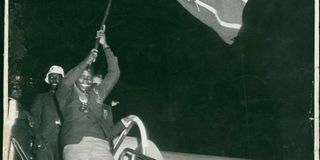
Ben Jipcho (front, holding flag), the then captain of Team Kenya, leads his victorious contingent back to Nairobi from 10th Commonwealth Games held in Christchurch, New Zealand in 1974. Jipcho won gold in 3,000 metres steeplechase and 5,000m as well as bronze in the 1,500 metres. Kenya won 18 medals. PHOTO | FILE | NATION MEDIA GROUP
When asked why he didn’t choose to train in America, Jipcho said: ”At home I have enough time to train in the morning and evening and I can concentrate on my work. Studying requires a greater effort and after running 8 miles in the morning you wouldn’t be able to study well. And this makes a difference.
"Before they said no record can be set on African soil, I think there is nowhere that a world record cannot be set, provided the competition is tough and you are fit.”
A large Kenyan and African contingent also travelled to Christchurch to compete mainly in track and field, and boxing. Africa won 11of the 44 boxing medals with Kenya’s Stephen Muchoki taking gold in the light-featherweight.
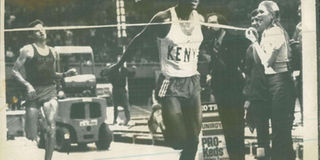
Kenya'a Ben Jipcho leaves world record holder Jim Ryun behind as he wins the mile during the sensational professional debut at Uniondale, New York in this undated photo. Jipcho also won the two-mile event. PHOTO | FILE | NATION MEDIA GROUP
In track and field Kenya famously won the 4 X 400m final with Charles Asati, Francis Musyoki, Bill Koskei and Julius Sang. Asati went on to win the 400m individual race while John Kipkurgat won the 800m final.
In the 800m women’s race Sabina Chebichi took bronze behind Australia’s Charlene Rendina and New Zealand’s Sue Haden.
Five hours after winning his 1500M heat Jipcho took the 5,000m gold medal, ‘in what was a training run for him’, said Christchurch’s Press newspaper.
Jipcho trailed David Black and then crowd favorite Brendan Foster before out-sprinting Foster on the home stretch, clocking a world class time of 13:41.
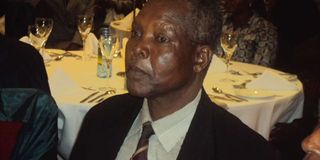
Athletics legend Ben Jipcho. PHOTO | FILE | NATION MEDIA GROUP
Jipcho went on to win the 3000m steeplechase, a race that was overshadowed by a collision between Wale’s John Davies and Kenya’s Evans Mogaka after which both athletes were absolved from blame.
Davies took silver and Mogaka bronze. “Jipcho Two Up and One To Go In Games Three Gold Target” read the newspaper headline on the last day of the games.
The 1,500m race was arguably the greatest ever ran and it belonged to Filbert Bayi, the 19-year-old Tanzanian.
Bayi had shown his class a year earlier at the 1973 All Africa Games in Lagos, Nigeria, when he beat Kipchoge Keino to win the 1500m.
Taking off at a sprint, Bayi led from start to finish. When Bayi crossed the tape, New Zealander John Walker and Ben Jipcho were strung out behind him. Bayi broke Jim Ryun’s world record, running the race in 3:32.16.
Both Bayi and Walker ran under Jim Ryun’s world record. So quick was the pace that the first five runners ran in the top seven fastest times of the 1,500m to that date and five national records were broken.
“Australias’s day, Jipcho’s Games," read the newspapers headline the following day. The games star attraction did not disappoint Christchurch.
With two gold and a bronze in his bag, Jipcho’ s outing remained the star performance of the 1974 Commonwealth Games. Throw in a road.




